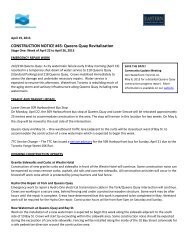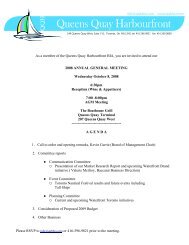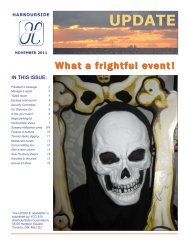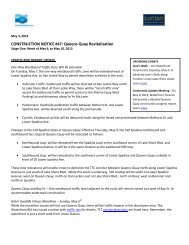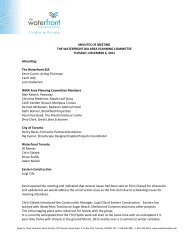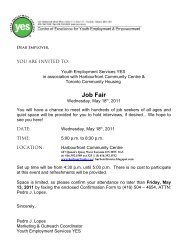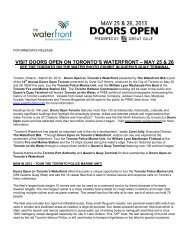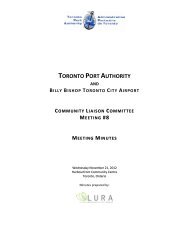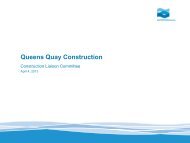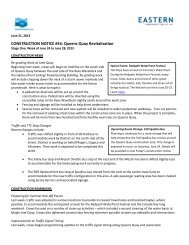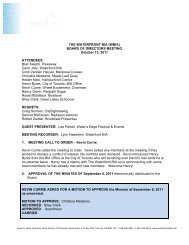Untitled - Waterfront BIA
Untitled - Waterfront BIA
Untitled - Waterfront BIA
Create successful ePaper yourself
Turn your PDF publications into a flip-book with our unique Google optimized e-Paper software.
TRANSPORTATION COMMITTEE<br />
Parking and Transportation Policy for TA<strong>BIA</strong><br />
TA<strong>BIA</strong> supports the principal of a diverse transportation system, utilizing several modes of<br />
transportation. Parking and transportation within the city are linked activities. The City should work to<br />
make each form attractive, functional and accommodating for Toronto’s many neighbourhoods.<br />
TA<strong>BIA</strong> requests that the TTC allow the use of transfers for hopping off and back on while traveling<br />
in one direction.<br />
• Thousands of TTC riders pass by neighbourhood shops and restaurants as they travel, unable to drop<br />
in. Couples cannot meet up at a local restaurant for a meal, or meet their spouse near work, before<br />
they head home. Children cannot meet up with their parents on the way to their destination. Yet, the<br />
cost of allowing this family based, neighbourhood access, use of the transfers would cost very little.<br />
• The cost of a monthly TTC pass is far too high to attract new users. Several pricing packages should<br />
be available to meet individual needs.<br />
TA<strong>BIA</strong> requests utilizing the Toronto Parking Authority, and adopt its policy of using courtesy<br />
envelopes, for policing public street parking.<br />
• Parking metering was originally established to create more parking by creating turnover in parking<br />
places. The workers at the shops were parking all day in the best spots. Short-term parking allowed<br />
more people to share the available spaces. Today pay and display parking is a revenue stream with<br />
an aggressive police force working to quotas. This manner of enforcement creates a negative<br />
impression for customers of businesses on public streets.<br />
• Parking by residents on public streets, in permit areas, is far below value. An increase could offset<br />
any loss from courtesy envelopes.<br />
• The Parking Authority should be encouraged in the creation of more off street parking in<br />
neighbourhood commercial areas.<br />
TA<strong>BIA</strong> requests a charge or tax on free parking spaces provided by commercial retailers.<br />
• Current trends in retail have created a car culture lured by “acres of Free Parking”. Free parking puts<br />
public shopping streets at a great disadvantage and erodes neighbourhood shopping. The use of land<br />
for retail malls and big box stores with free parking encourages automobile use. The free parking<br />
areas are considered undeveloped land and not taxed appropriately. The property tax paid by this<br />
form of retail development is far less than a typical neighbourhood retail street of the same size,<br />
provides to the city.<br />
TA<strong>BIA</strong> requests that incentives for high-efficiency, hybrid, fuel cell and electric automobiles be<br />
part of the transportation strategy within the City of Toronto.<br />
TA<strong>BIA</strong> requests that the use of handicapped parking permits should be more carefully issued and<br />
limited in time to a 1-hour period when used in No Parking areas of our public streets.<br />
14



